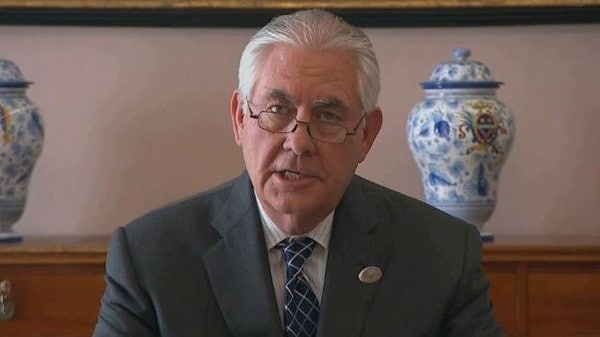U.S. President Donald Trump's removal of U.S. Secretary of State Rex Tillerson and his appointment of CIA director Mike Pompeo to replace him have garnered positive reactions in the Saudi press. In its March 14, 2018 editorial, the Saudi daily 'Okaz stressed the great importance of the reshuffle at the U.S. State Department, calling it a positive move that would lead to a change in the attitude towards Iran and to the elimination of the threat posed by the militias loyal to it in the Middle East, and to improved security and stability for the region. The same day, Al-Arabiyya TV presenter Mashari Al-Dhaidi also predicted, in his column in the London-based Saudi daily Al-Sharq Al-Awsat, that Tillerson's departure would increase the pressure on Iran and put an end to the pro-Qatar policy espoused by Tillerson.
The following are translated excerpts of the 'Okaz editorial and of Al-Dhaidi's column:

Rex Tillerson (image: alarabiya.net)
In its March 14, 2018 editorial, 'Okaz wrote: "Yesterday's changes in the American administration are tremendously important, in light of the great challenges threatening U.S. interests in the region and in the world. [These challenges] are compelling it to step up its diplomatic activity, in order deal with the forthcoming dangers, particularly from Iran. The epitome of U.S. foreign policy in the Middle East is implementing [President] Trump's campaign promises, including eliminating the Islamic State (ISIS) and [other] terror organizations, and fighting the danger posed by Iran – considered a danger not only to the U.S. but also to Europe.
"Accordingly, the recent decisions are an improvement in U.S. foreign policy, and ones that will lead to actualization of the general strategy of the White House policy that is embodied in the construction of a new framework for the issue of security in the Middle East.
SUPPORT OUR WORK

"These essential changes in the U.S. policy vis-à-vis Iran are very important at this stage, and are consistent with the developments in the Iranian arena and with the ongoing threats posed by the militias loyal to the regime of the [Iranian] mullahs, in Yemen, Syria, Iraq, and Lebanon. They will contribute to deterring [the militias] and to the elimination of their terror activity, which threatens the security and stability of the entire region."[1]
Mashari Al-Dhaidi wrote in his March 14 column in Al-Sharq Al-Awsat: "What happened now has been anticipated for several months – the firing of [U.S.] Secretary of State Tillerson, who came from the oil and energy business and who did not agree at all with Trump's foreign policy. His presence in the [U.S. administration] staff was odd, particularly since Trump is now leading profound foreign policy changes, the most recent of which was his intent to meet with the president of the nuclear North Korea in order to end the historic and complex problem with it.
"Even [if he did so] in an agreeable manner, Tillerson opposed Trump's aggressive stance vis-à-vis Iran and his support of the position of the Arab Quartet – Saudi Arabia, Egypt, the UAE, and Bahrain – against the harmful Qatari policy, and tended more towards the Qatari version [of the situation]. During the Qatar-Arab crisis, he adopted the Qatari-Muslim Brotherhood position, and called for lifting the siege on Qatar, while the Arab Quartet opposed this, and said that it was carrying out a sovereign operation – that is, a boycott...
"With regard to the new secretary of state, [former CIA director] Mike Pompeo, a former Congressman, an alumnus of the top-flight Harvard Law School, and an officer in the U.S. army who served in the war to liberate Kuwait in 1991 – he is always on the same wavelength as Trump... Gina Haspel, who has inherited the role of CIA director, was Pompeo's deputy [in the CIA], and she is a senior American intelligence official...
"Tillerson's departure will worry those who were betting that a certain voice within the Trump administration [i.e. Tillerson's] would reduce the pressure on Iran and would advance the Qatari-Muslim Brotherhood version [of the situation] – even though, if truth be told, they may have expected too much from Tillerson.
"A year and a few months into Trump's presidency, bit by bit, the characteristics of [our] alliance with the Trump administration are becoming clear, and the [American] voice is [now] compatible [with our own voice]. [We] Arabs expect that this will have an impact on our problems – and oh, how numerous they are!"[2]




